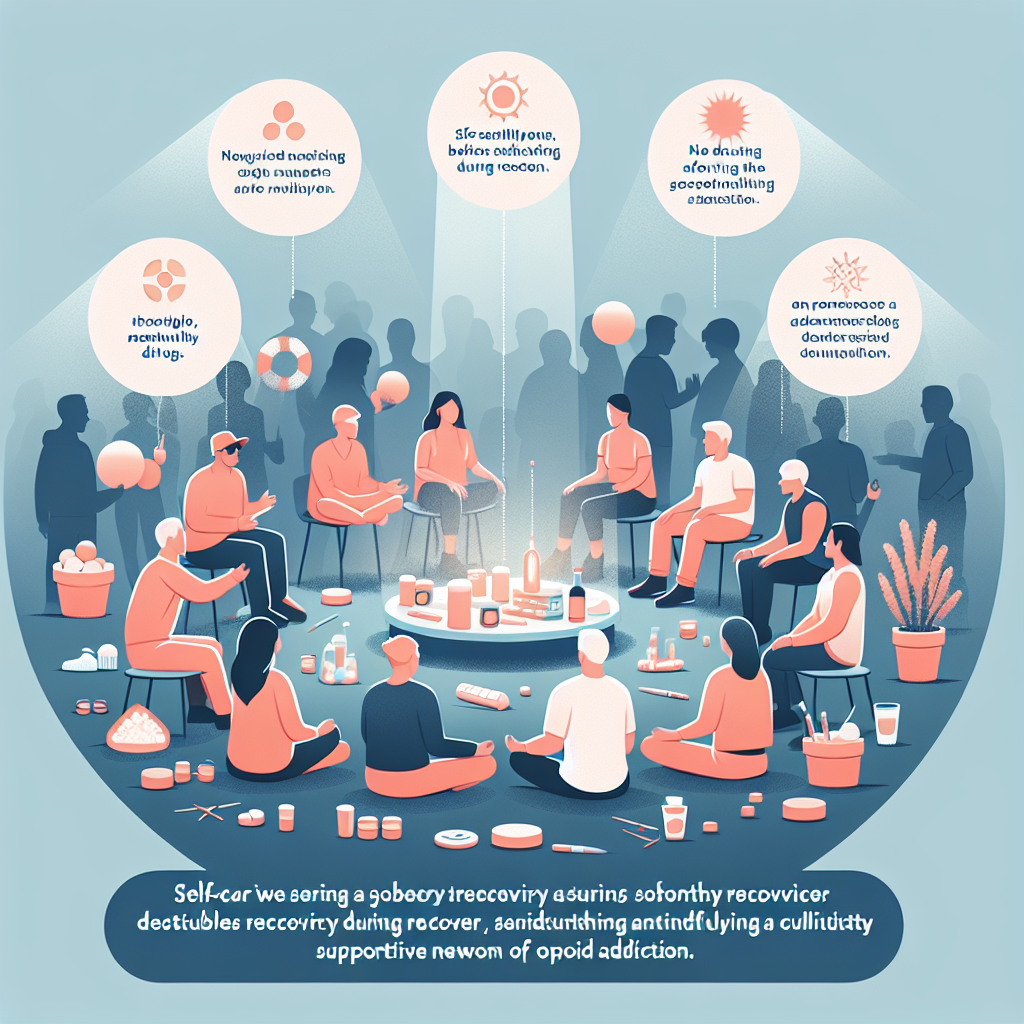Table of Contents
“Navigating New Beginnings: Empowering Social Connections in Heroin Recovery”
Introduction

Recovering from heroin addiction is a challenging journey that requires not only physical and mental resilience but also a strategic approach to social interactions. Social situations can be particularly daunting for individuals in recovery, as they often involve triggers, temptations, and emotional stressors that can jeopardize sobriety. Successfully navigating these scenarios is crucial for maintaining long-term recovery and rebuilding a healthy, fulfilling life. This guide provides practical strategies and insights on how to handle social situations during recovery from heroin addiction, emphasizing the importance of preparation, support systems, and self-awareness. By understanding and implementing these techniques, individuals can better manage social pressures, avoid relapse, and foster positive relationships that support their ongoing recovery journey.
Building a Support Network During Recovery
Navigating social situations during recovery from heroin addiction can be a daunting task, but building a strong support network is crucial for long-term success. The journey to sobriety is not one that should be traveled alone; having a reliable support system can make all the difference. To begin with, it is essential to identify individuals who genuinely care about your well-being and are willing to support you through the ups and downs of recovery. These people can be family members, close friends, or even mentors who have experienced similar struggles. By surrounding yourself with positive influences, you create an environment conducive to healing and growth.
Transitioning from active addiction to recovery often involves distancing oneself from old acquaintances who may still be using drugs. This can be a challenging but necessary step. It is important to communicate your boundaries clearly and assertively, explaining that you are committed to your recovery and cannot be around substances or environments that may trigger a relapse. While this may lead to feelings of isolation initially, it opens the door to forming new, healthier relationships.
In addition to personal connections, joining support groups can be incredibly beneficial. Groups such as Narcotics Anonymous (NA) provide a safe space to share experiences, gain insights, and receive encouragement from others who understand the struggles of addiction. These meetings foster a sense of community and belonging, which can be particularly comforting during times of vulnerability. Moreover, hearing success stories from others who have maintained their sobriety can serve as a powerful source of inspiration and motivation.
Another vital aspect of building a support network is seeking professional help. Therapists and counselors specializing in addiction recovery can offer valuable guidance and coping strategies. They can help you navigate the emotional and psychological challenges that often accompany recovery. Additionally, they can assist in developing a personalized plan to address any underlying issues that may have contributed to your addiction. By working with a professional, you gain access to tools and resources that can significantly enhance your recovery journey.
Furthermore, engaging in activities that promote physical and mental well-being can also aid in building a support network. Participating in group fitness classes, joining a sports team, or taking up a new hobby can introduce you to like-minded individuals who share your interests and values. These activities not only provide a healthy distraction from cravings but also help to rebuild self-esteem and confidence, which are often eroded by addiction.
It is also important to practice self-compassion and patience throughout this process. Recovery is a gradual journey, and setbacks are a natural part of it. When faced with challenges, lean on your support network for encouragement and reassurance. Remember that asking for help is a sign of strength, not weakness. By being open and honest about your struggles, you allow others to provide the support you need.
In conclusion, building a support network during recovery from heroin addiction is a multifaceted process that involves distancing from negative influences, forming new connections, participating in support groups, seeking professional help, and engaging in healthy activities. By taking these steps, you create a solid foundation for lasting sobriety. Embrace the journey with determination and hope, knowing that with the right support, a fulfilling and drug-free life is within reach.
Setting Boundaries with Friends and Family
Navigating social situations during recovery from heroin addiction can be a challenging yet crucial aspect of the healing process. Setting boundaries with friends and family is essential to maintaining sobriety and fostering a supportive environment. The journey to recovery is deeply personal, and establishing clear boundaries can help protect your mental and emotional well-being.
Firstly, it is important to communicate openly with your loved ones about your recovery journey. Transparency can foster understanding and support, which are vital during this time. Let your friends and family know about your commitment to sobriety and the steps you are taking to achieve it. This can help them understand the importance of respecting your boundaries and the role they play in your recovery.
In addition to open communication, it is essential to identify and articulate your boundaries clearly. This might include avoiding certain social situations where drug use is prevalent or asking friends and family not to consume substances around you. It is perfectly acceptable to decline invitations to events that may jeopardize your sobriety. Remember, your health and recovery come first, and true friends and supportive family members will understand and respect your decisions.
Moreover, it is crucial to surround yourself with positive influences. Seek out friends and family members who support your recovery and encourage healthy, sober activities. Engaging in new hobbies or interests can also help you build a network of supportive individuals who share your commitment to a drug-free lifestyle. This positive reinforcement can be incredibly empowering and can help you stay focused on your recovery goals.
Setting boundaries also involves managing your emotional well-being. Recovery can be an emotional rollercoaster, and it is important to recognize when you need space or time to process your feelings. Do not hesitate to take a step back from social situations if you feel overwhelmed or triggered. Practicing self-care and mindfulness can help you stay grounded and resilient during challenging times.
Furthermore, it is important to seek professional support when needed. Therapists, counselors, and support groups can provide valuable guidance and encouragement as you navigate social situations and set boundaries. They can offer strategies for coping with difficult emotions and help you develop healthy communication skills. Engaging with a support group can also provide a sense of community and shared experience, which can be incredibly comforting during recovery.
It is also essential to be patient with yourself and your loved ones. Recovery is a gradual process, and it may take time for friends and family to fully understand and respect your boundaries. Be patient and persistent in communicating your needs, and remember that it is okay to reinforce your boundaries if they are not being respected. Your well-being is paramount, and it is important to prioritize your recovery above all else.
In conclusion, setting boundaries with friends and family is a vital component of recovery from heroin addiction. By communicating openly, identifying and articulating your boundaries, surrounding yourself with positive influences, managing your emotional well-being, seeking professional support, and practicing patience, you can create a supportive environment that fosters your sobriety. Remember, recovery is a journey, and every step you take towards setting and maintaining boundaries is a step towards a healthier, more fulfilling life. Stay strong, stay committed, and believe in your ability to overcome the challenges that come your way.
Navigating Social Events Without Relapsing
Navigating social events during recovery from heroin addiction can be a daunting task, but with the right strategies and mindset, it is entirely possible to enjoy these occasions without jeopardizing your sobriety. The first step in handling social situations is to be honest with yourself about your triggers and limitations. Understanding what environments or interactions might tempt you to relapse is crucial. This self-awareness allows you to plan ahead and make informed decisions about which events to attend and how to handle them.
One effective strategy is to bring a supportive friend or family member with you. Having someone who understands your journey and can offer encouragement can make a significant difference. This person can act as a buffer in uncomfortable situations and help you stay focused on your goals. Additionally, it’s beneficial to have a pre-planned exit strategy. If you start feeling overwhelmed or tempted, knowing you can leave at any time provides a sense of control and security.
Another important aspect is to stay engaged in conversations and activities that do not revolve around substance use. Seek out individuals who share your interests and values, and steer clear of those who might pressure you into old habits. Engaging in meaningful conversations can distract you from cravings and reinforce your commitment to sobriety. Moreover, participating in activities that promote a healthy lifestyle, such as sports or creative hobbies, can provide a positive outlet for your energy and emotions.
It’s also essential to practice self-care before and after social events. Ensure you are well-rested, nourished, and mentally prepared before attending any gathering. After the event, take time to reflect on your experience and acknowledge your achievements. Celebrating small victories, such as successfully navigating a social event without relapsing, can boost your confidence and motivation.
In addition, setting clear boundaries is vital. Communicate your needs and limitations to those around you. True friends and supportive family members will respect your boundaries and help you maintain them. If someone does not respect your recovery journey, it may be necessary to distance yourself from that relationship, at least temporarily. Your sobriety should always be your top priority.
Furthermore, staying connected with your support network is crucial. Regularly attending support group meetings or therapy sessions can provide ongoing encouragement and accountability. Sharing your experiences and challenges with others who understand can be incredibly therapeutic and empowering. These connections remind you that you are not alone in your journey and that others have successfully navigated similar challenges.
Lastly, maintaining a positive mindset is key. Focus on the progress you have made and the benefits of your new, sober life. Visualize your goals and the future you are working towards. Positive affirmations and mindfulness practices can help reinforce your commitment to sobriety and reduce anxiety in social situations.
In conclusion, navigating social events without relapsing requires a combination of self-awareness, planning, support, and a positive mindset. By understanding your triggers, bringing supportive companions, engaging in healthy activities, practicing self-care, setting boundaries, staying connected with your support network, and maintaining a positive outlook, you can successfully handle social situations during your recovery from heroin addiction. Remember, every step you take towards maintaining your sobriety is a testament to your strength and resilience.
Communicating Your Recovery Journey to Others
Communicating your recovery journey to others can be a delicate yet empowering process, especially when recovering from heroin addiction. It is essential to approach these conversations with honesty, clarity, and a sense of purpose. The first step in this journey is to understand that your recovery is a personal triumph, and sharing it with others can foster support and understanding. However, it is equally important to recognize that not everyone will respond in the same way, and that’s okay.
When you decide to open up about your recovery, choosing the right moment and setting can make a significant difference. Opt for a quiet, private space where you can speak without interruptions. This allows both you and the listener to engage fully in the conversation. Begin by expressing your gratitude for their presence in your life and their support. This sets a positive tone and helps the listener feel appreciated.
As you delve into your story, be honest about your struggles and the steps you have taken to overcome them. Transparency can build trust and show the depth of your commitment to recovery. It’s important to highlight the progress you’ve made and the strategies that have helped you along the way. This not only provides a clear picture of your journey but also serves as an inspiration to others who may be facing similar challenges.
While sharing your story, be prepared for a range of reactions. Some people may respond with empathy and support, while others might need time to process the information. It’s crucial to remain patient and understanding, giving them the space they need to come to terms with your revelation. Remember, their initial reaction does not define their long-term support.
In addition to sharing your journey, it’s beneficial to educate others about addiction and recovery. Many people have misconceptions about heroin addiction, and providing accurate information can help dispel myths and reduce stigma. Explain that addiction is a complex disease that requires comprehensive treatment and ongoing support. By educating others, you not only foster a more supportive environment for yourself but also contribute to a broader understanding of addiction.
Setting boundaries is another essential aspect of communicating your recovery. Clearly articulate what kind of support you need and what behaviors or topics are off-limits. This helps prevent uncomfortable situations and ensures that your recovery remains the priority. For instance, if certain social settings or conversations trigger cravings or negative emotions, let your friends and family know so they can help you avoid them.
Moreover, it’s important to surround yourself with a supportive network. Seek out individuals who understand your journey and are committed to helping you stay on track. This might include joining support groups, connecting with a sponsor, or finding a mentor who has successfully navigated recovery. These connections can provide invaluable encouragement and guidance.
Lastly, remember to celebrate your milestones, no matter how small they may seem. Recovery is a continuous process, and acknowledging your achievements can boost your confidence and motivation. Share these moments with your loved ones, allowing them to witness your growth and resilience.
In conclusion, communicating your recovery journey to others is a powerful step in maintaining sobriety and building a supportive network. By approaching these conversations with honesty, patience, and education, you can foster understanding and reduce stigma. Setting boundaries and surrounding yourself with supportive individuals further strengthens your recovery. Embrace your journey, celebrate your progress, and inspire others with your story of resilience and hope.
Q&A
1. **How can I prepare for social situations to avoid triggers?**
– Plan ahead by identifying potential triggers and have a strategy in place, such as bringing a supportive friend or having an exit plan.
2. **What should I do if someone offers me drugs at a social event?**
– Politely but firmly decline and remove yourself from the situation if necessary. Have a rehearsed response ready to make it easier.
3. **How can I explain my recovery to friends and family?**
– Be honest and straightforward about your recovery journey, emphasizing the importance of their support and understanding.
4. **What are some safe social activities I can engage in during recovery?**
– Participate in activities that do not involve drugs or alcohol, such as sports, hobbies, volunteering, or attending support group meetings.
Conclusion
Handling social situations during recovery from heroin addiction involves several key strategies. First, it is crucial to establish a strong support network, including friends, family, and support groups, who understand and respect your recovery journey. Setting clear boundaries and communicating your needs to those around you can help prevent exposure to triggers. Avoiding environments and social circles associated with past drug use is essential to minimize the risk of relapse. Engaging in new, healthy activities and hobbies can provide positive social interactions and a sense of fulfillment. Additionally, developing coping mechanisms and stress management techniques, such as mindfulness and therapy, can help navigate challenging social scenarios. Overall, maintaining a focus on personal well-being and seeking continuous support are vital for successfully managing social situations during recovery.



